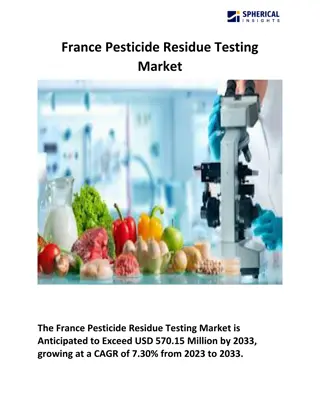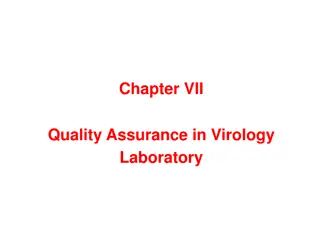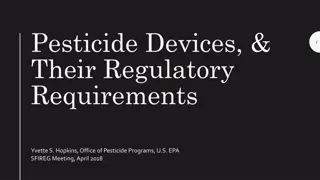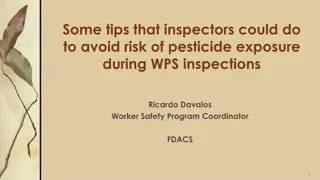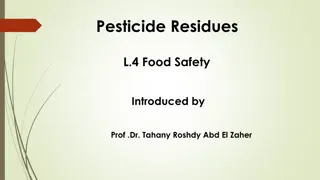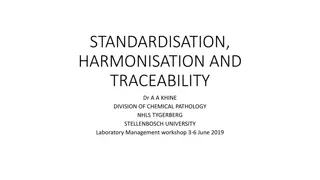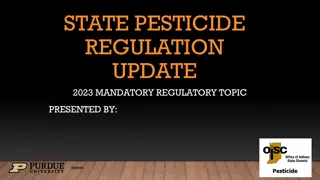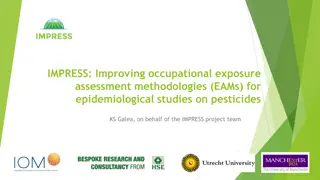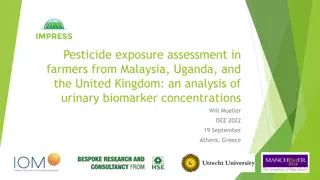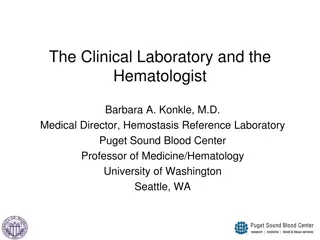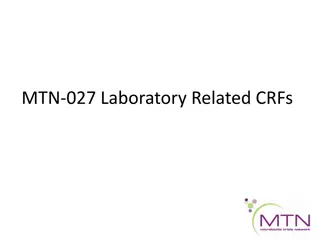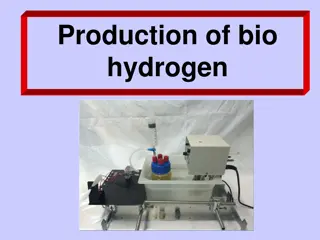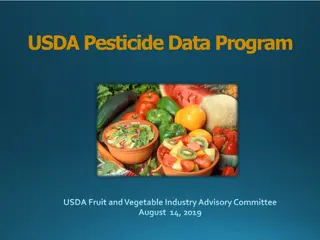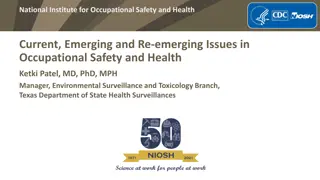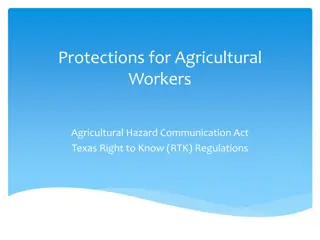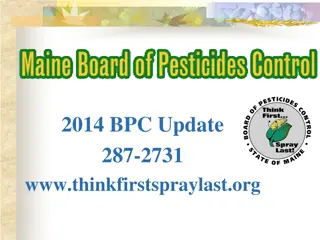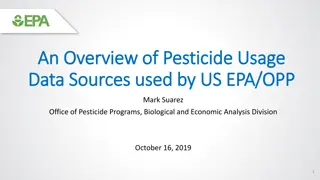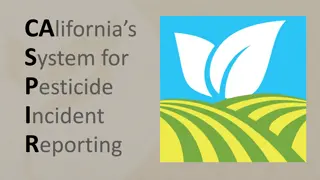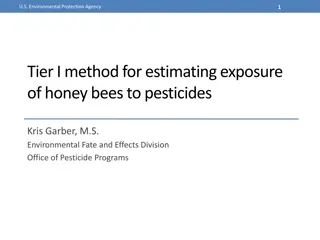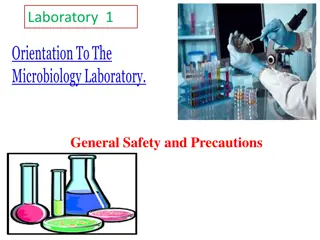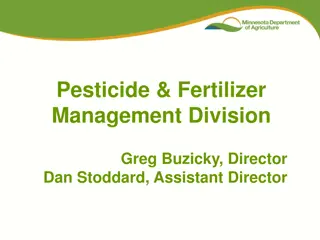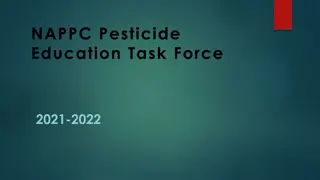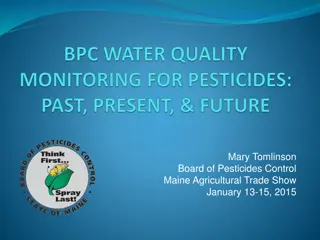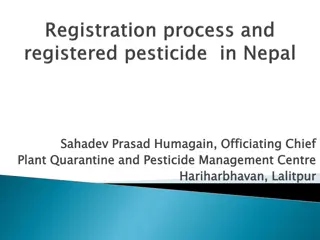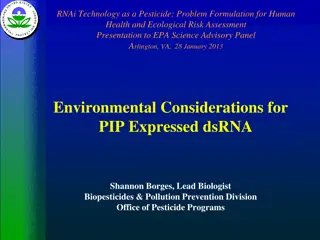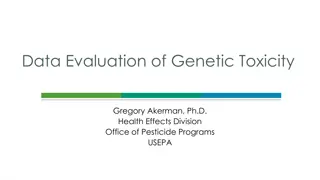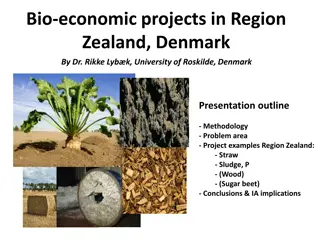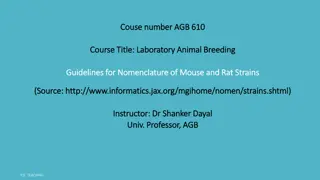Bio Septic Tank In Chennai - Global Enterprises
Bio Septic Tank in Chennai - Global Enterprises\n\nGlobal Enterprises in Chennai offers innovative Bio Septic Tank solutions for residential and commercial properties. Our Bio Septic Tanks are designed to efficiently manage wastewater while being environmentally friendly.
1 views • 5 slides
FRP Bio Septic Tank In Chennai - Global Enterprises
FRP Bio Septic Tank In Chennai - Global Enterprises\n\nGlobal Enterprises offers top-quality FRP bio septic tanks in Chennai. Our septic tanks are designed to provide efficient and eco-friendly sewage treatment solutions for residential, commercial, and industrial applications.
2 views • 12 slides
Sustainable Rice Production in Pakistan: Challenges and Strategies
Pakistan's economy heavily relies on rice exports, with the country being a significant producer and exporter. However, challenges such as pesticide residues, major insect pests, and diseases threaten rice production. Key parameters for production include cultivation of improved varieties, pest mana
2 views • 42 slides
Enhancing Laboratory Billing Services with MedKarma, A Comprehensive Guide
In the dynamic healthcare landscape, laboratory billing services play a crucial role in ensuring smooth financial operations for medical laboratories. Effective billing practices not only streamline revenue cycles but also enhance overall operational efficiency. MedKarma, a leading provider of labor
2 views • 7 slides
France Pesticide Residue Testing Market
The France Pesticide Residue Testing Market is Anticipated to Exceed USD 570.15 Million by 2033, growing at a CAGR of 7.30% from 2023 to 2033.\u00a0\n
0 views • 4 slides
Quality Assurance in Virology Laboratory
This chapter focuses on quality assurance in virology laboratory, covering topics such as quality control, documentation of test results, laboratory safety rules, and more. It explains the types of quality control, quality assurance cycle, and process areas of quality assurance in laboratory testing
3 views • 19 slides
Understanding Regulatory Requirements for Pesticide Devices
Pesticide devices, as defined by FIFRA, play a crucial role in trapping, destroying, repelling, or mitigating pests or plant and animal life. While not required to be registered with the EPA, these devices are regulated under FIFRA sections 2(q)(1), 7, and 8, with specific labeling and packaging req
0 views • 10 slides
Tips to Prevent Pesticide Exposure During WPS Inspections
Inspectors should be familiar with establishment operations, inquire about pesticide use, avoid entering treated areas without assurance, wear proper PPE, identify decontamination supplies, and practice good hygiene to minimize the risk of pesticide exposure during inspections. These precautions hel
5 views • 10 slides
Best service for Bio Gel in Twin Lakes
Cindy Nails Spa serves the Best service for Bio Gel in Twin Lakes. They specialize in a wide range of nail services, including Gel X, bio gel, and acrylic full sets. Whether you're looking for a long-lasting, glossy finish or a durable and stylish na
0 views • 6 slides
Extraction Methods in Pesticide Residue Analysis for Food Safety
Extraction methods play a crucial role in separating pesticide residues from food matrices for analysis. Techniques involve using solvents to efficiently remove pesticides without causing chemical changes. The choice of extraction method depends on the substrate type, with liquid and solid substrate
6 views • 25 slides
Achieving Comparable Results in Laboratory Practice
Good laboratory practice necessitates minimal error in measurement to reflect a patient's biological condition accurately, ensuring comparable and reliable results regardless of testing location or method. Standardization, harmonization, and traceability play crucial roles in achieving uniformity an
0 views • 29 slides
Buy Bio Hyalux Online - dermafillerstore.com
Buy Bio Hyalux Online is a hyaluronic acid-based product designed to enhance skin hydration, reduce the appearance of fine lines and wrinkles, and promote a youthful complexion. \nBuy Bio Hyalux Online is a hyaluronic acid-based product designed to e
1 views • 3 slides
State Pesticide Regulation Update 2023: Mandatory Changes and Stakeholder Involvement
The State Pesticide Regulation Update for 2023 brings significant changes including Restricted Use Pesticide applications, record-keeping requirements, and supervision of applicators. The revisions were prompted by applicator certification and training rules set by the EPA, along with public awarene
0 views • 25 slides
Enhancing Pesticide Exposure Assessment for Epidemiological Studies
Focuses on IMPRESS project aiming to improve methodologies for assessing occupational pesticide exposure in epidemiological studies. Reviews challenges in retrospective exposure assessment, proposes methodologies, and presents key project results to date, emphasizing the use of various exposure asse
1 views • 15 slides
Pesticide Exposure Assessment in Farmers from Malaysia, Uganda, and the United Kingdom
This study evaluates the impact of pesticide exposure on farmers' health in Malaysia, Uganda, and the UK using urinary biomarker concentrations. Multiple cohorts are analyzed to assess associations between exposure-modifying factors and urine metabolite measurements. The IMPRESS project focuses on i
0 views • 12 slides
Insights into Hematology Laboratory Practice
This resource explores the potential role of hematologists in laboratory settings, discussing board certification, advantages, challenges, current training trends, and core curriculum lectures in hematology. It sheds light on the critical areas of laboratory training, emphasizing the importance of u
0 views • 9 slides
Laboratory Related CRFs for Pharmacokinetics Study
This collection encompasses various CRFs related to laboratory procedures in the context of Pharmacokinetics for a study. It includes forms for enrollment, specimen storage, safety laboratory results, and specific days for sample collection. The CRFs detail the storage, collection, and documentation
0 views • 14 slides
Enhancing Pesticide Spray Effectiveness with Adjuvants for Rosarians
Adjuvants play a crucial role in improving the efficacy of pesticide applications for rosarians. They aid in maximizing the impact of pesticides by enhancing their application process. Various types of adjuvants, such as surfactants, extenders, and penetrants, serve different purposes like adjusting
0 views • 11 slides
Bio Hydrogen Production Experiment: Materials, Set-Up, and Procedure
This experiment focuses on the production of bio hydrogen using sugar beet cuttings and dried cultures as substrates. The materials required include a bioreactor, fuel cell, and various components for setting up the experiment. The experimental set-up involves preparing the fermentation bottle, subs
0 views • 18 slides
USDA Pesticide Data Program Overview
The USDA Pesticide Data Program (PDP) provides high-quality pesticide residue data for US foods to support regulatory decision-making and ensure food safety. Through cooperative agreements with participating states, the program conducts sampling of various commodities, including fresh fruits and veg
0 views • 17 slides
Occupational Pesticide Safety and Health Concerns
Occupational safety and health issues related to pesticide exposure are a significant concern globally. Limited surveillance data on pesticide exposure and related illnesses are available, with a high percentage of farmers being affected annually. Various occupations beyond farming also face potenti
1 views • 25 slides
Agricultural Workers' Protections under Right-to-Know Regulations
Agricultural workers in Texas have rights under the Agricultural Hazard Communication Act, also known as Right-to-Know (RTK) Law. This Act ensures that agricultural workers receive essential information regarding pesticide exposure, workplace chemicals, and their entitlement to health and safety det
0 views • 15 slides
Important Updates in Pesticide Regulations and Program Changes
New pesticide regulations and program changes are introduced, including requirements for obtaining a pesticide applicator license, major proposed changes to the Worker Protection Standard (WPS) by the EPA, introduction of new inspectors, and the phaseout of Endosulfan. Special Maine registrations fo
0 views • 66 slides
Understanding Pesticide Data Collection and Analysis
Pesticide data usage is crucial for accurate assessments and prioritization of areas with high likelihood of usage. Various sources, quality requirements, and data considerations are highlighted, emphasizing the importance of incorporating usage data for informed decision-making.
0 views • 12 slides
Essential Facilities in a Bio-Pesticide Laboratory for Smart Agriculture
Establishing a bio-pesticide laboratory is vital for research, development, and mass production of bio-pesticides. Key rooms include sterilization, media preparation, inoculation, growth chamber, mixing, insect rearing, and washing rooms. The sterilization room houses equipment like autoclave and ho
0 views • 10 slides
California's System for Pesticide Incident Reporting Overview
Explore California's CASPIR system for reporting pesticide incidents, designed to enhance communication between counties, DPR, and fieldworker groups. The system's timeline, purpose, and key features, including incident report submission, intelligent case routing, mobile app functionality, and admin
0 views • 33 slides
Bio-inspired Networking and Complex Networks: A Survey
This survey explores the challenges in future wireless networks, bio-inspired networking principles, complex networks, and bio-inspired math modeling. It covers topics like self-organization, autonomous actions, foraging behavior of ant colonies, and more.
0 views • 22 slides
U.S. EPA Tier I Method for Bee Pesticide Exposure Estimation
Tier I assessment by the U.S. Environmental Protection Agency focuses on generating conservative estimates of pesticide exposures to honey bees. The goal is to differentiate pesticides that pose risks to bees from those needing further evaluation. The process involves considering food consumption ra
0 views • 53 slides
Laboratory General Safety and Precautions
Microbiology involves the study of microorganisms such as bacteria, fungi, viruses, and parasites. It is crucial to maintain strict safety protocols in the laboratory to prevent contamination and ensure the well-being of individuals handling these potentially pathogenic organisms. Rules like wearing
0 views • 26 slides
Pesticide & Fertilizer Management Division Overview
The Pesticide & Fertilizer Management Division is a key state agency in Minnesota responsible for regulating pesticides and fertilizers, protecting groundwater, responding to emergencies, managing spills, and promoting agricultural water quality. The division works with farmers, industry stakeholder
0 views • 11 slides
NAPPC Pesticide Education Task Force 2021-2022 Summary
The NAPPC Pesticide Education Task Force for 2021-2022 aims to utilize pesticide registration and regulation as tools to safeguard and enhance pollinator health. The task force focuses on educating various audiences, including pesticide applicators, farmers, homeowners, educators, and state departme
1 views • 15 slides
Exploring Pesticide Monitoring and Contamination Studies in Maine
Mary Tomlinson's work with the Maine Board of Pesticides Control includes past studies on groundwater and surface water monitoring, ongoing monitoring initiatives, and future collaborative studies. The State Law mandates residue surveys to identify possible contamination sources and develop a pestic
1 views • 55 slides
Procedures and Management of Pesticide Registration in Nepal
This content provides detailed information on the registration procedures, management, and regulation of pesticides in Nepal. It covers the registration method, advantages of analogous registration, banned pesticides list, types of pesticides, and essential documentation requirements for pesticide r
0 views • 43 slides
Understanding Laboratory Animal Genetics and Research Importance
This course (AGB 610) delves into the realm of laboratory animal breeding, exploring the significance of using animals in research and teaching. Dr Shanker Dayal, a distinguished professor, guides students through lectures on animal genetics and the common uses of laboratory animals. The course emph
0 views • 14 slides
Understanding Environmental Risks of RNAi Technology as a Pesticide
This presentation discusses the environmental considerations and risk assessments associated with RNAi technology as a pesticide, focusing on the unique challenges presented by dsRNA PIPs. Topics covered include ecological risk assessments, nontarget organism exposure, exposure assessments for PIP p
0 views • 13 slides
Evaluation of Genetic Toxicity in Pesticide Programs - Data Overview
The presentation by Dr. Gregory Akerman discusses the evaluation of genetic toxicity, focusing on genotoxicity data for glyphosate, including gene mutation, chromosomal abnormality, and primary DNA damage. It explores the consequences of genotoxicity, such as cancer risks and cell death, along with
0 views • 27 slides
Exploring the Role and Objectives of Laboratory Teaching
The content delves into the various perspectives on laboratory teaching, its aims, pedagogical levels, and common challenges faced. It discusses specific aims of laboratory teaching, including familiarization with equipment, teaching experimental work attitudes, and training in observation and deduc
0 views • 32 slides
Bio-Pesticides and Bio-Control Agents in Microbiology
Bacteria can infect various organisms, and some can be beneficial as bio-control agents against pests. Pseudomonas species and Bacillus thuringiensis are commonly used as bio-pesticides due to their abilities to inhibit pathogens and control insect populations effectively in agriculture.
0 views • 11 slides
Bio-Economic Projects in Zealand, Denmark: Enhancing Sustainable Biomass Utilization
Dr. Rikke Lybk from the University of Roskilde in Denmark presents bio-economic projects focusing on utilizing biomass resources like straw, sludge, wood, and sugar beet residues in Zealand. The methodology involves leveraging existing technology, circular economy principles, and new pathways to cre
0 views • 6 slides
Guidelines for Nomenclature of Laboratory Mouse and Rat Strains
Laboratory mice and rat strains have specific nomenclature guidelines to account for their genetic backgrounds and origins. Mouse strains are registered through the Mouse Genome Database, while rat strains are registered through the Rat Genome Database. The use of Laboratory Registration Codes is cr
0 views • 14 slides




